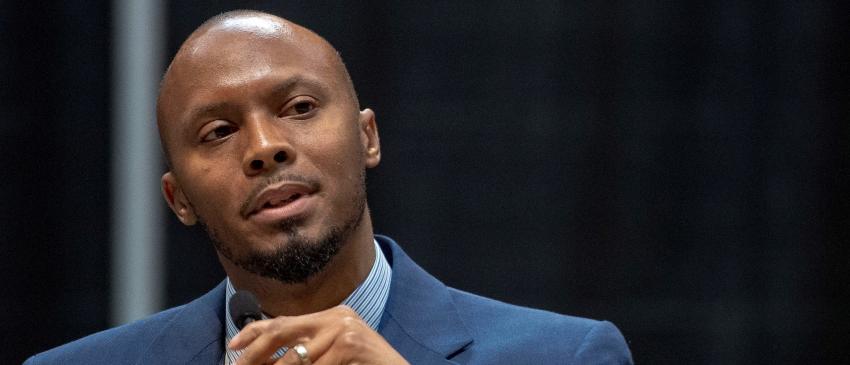Pettis says spring semester will mirror the fall semester
October 3, 2020
With the first half of the semester coming to an end, some students are anxiously awaiting the spring semester plans to be released. Even though the university has not released much information regarding the spring, there are some students who are anticipating that the spring semester will bring a sense of normalcy back to Alabama State University. However, according to the recently named Provost and Vice President of Academic Affairs Carl Pettis, Ph.D., the spring will mirror the university’s fall academic model, in terms of academics.
“I’m not confident in ASU’s ability to provide a safe and healthy environment for us however, because I’m graduating I will be back on campus,” said Student Government Association Attorney General Trentqual Rhone responding to Pettis’s statement that the spring will mirror the fall.
As the university’s chief academic officer, Pettis is responsible for eight colleges and the graduate school. Despite being interim before being officially named, Pettis is “humbled to have been named the provost” and takes his position on “with a great deal of respect and reverence.” During a global pandemic, Pettis is dedicated to keeping the sacredness of our academic programmatic offerings and looking to new horizons that could expand and extend the university’s footprint.
“We are certainly looking at extending what we are doing in an online environment, looking to take academic programs to distance education and be able to offer them online,” Pettis said, explaining his plans for the academic year. “The Office of Online and Distance Education program is going to be critical in doing that. We recently brought on Patrice Jones Ph.D. at the start of the semester, and the efforts being made there will be important in taking the university forward.”
Following the university President Quinton T. Ross, Ed.D., in his initiative to lead the university 150 years forward, Pettis explained that the plan to expand the university’s online presence was not merely a response to COVID-19. The university adjusted to the spring’s swift transition to an online environment. Noting the shift as “situational,” Pettis explained that he was clear with the academic leadership that “what we did in the summer was not to be done in the spring.”
“We needed more robust offerings from an online course selection over the summer, and I think the faculty and staff rose to the occasion as it relates to the summer,” said Pettis, commending the faculty and staff on their flexibility during these uncertain times. “It has been a great carry over into the fall. Students will be able to select online/hybrid as well as face-to-face classes in the spring.”
Pettis explained that it is “incumbent upon department chairs if more in-person classes will be offered in the spring.” Understanding that some courses such as practicums and laws require a face-to-face environment, Pettis believes that the department chairs will make decisions based on the students’ best interests. He also noted that as the university received an unprecedented number of first-year students enrolling somewhere between 1300 and 1600, it is almost impossible to offer all classes virtually.
“As an off-campus student I have accepted that online classes are apart of my college experience now,” said Shalyn Brown, a senior biology major. “Of course, I do not want to sit in a classroom with people who may possibly be infected but I can say I will miss the in-person learning environment.”
Unlike previous years, instead of staying on campus and taking finals the first week of December, the university decided that students would be moving to a fully online environment after Thanksgiving break. Despite much speculation from students on social media about the semester ending early, Pettis explained that the university will virtually administer all finals.
“This has been my most stressful semester,” said junior forensic biology major Kaunda Wooten Jr. “Online has been a good alternative, but it is not what I would prefer to do when compared to in-person classes. It is much harder to contact professors and obtaining information from class is tougher as well,” he continued expressing his frustration with the online platform of his classes. “If my scholarship allowed it, I would take a gap semester until COVID got more under control. I hope we return to in-person classes soon, mostly before I graduate.”
In terms of the protocol for students, faculty, and staff returning for the spring semester, Pettis said it will look “strikingly similar” to the fall, including the use of mini semesters and required COVID-19 testing before returning to campus. As the spring semester plans are still under construction and discussion, Pettis could not give more information. Yet, he ensured that the university would be making better use of the resources we already have.
“I do not like the online platform because some of my classes are too difficult to take online and we do not have enough resources on campus,” said junior biology major Ashlee Mitchell mirroring Wooten’s frustration. “I would really enjoy it if some of my classes had hybrid [options]. Such as maybe Monday we have in-person classes and Wednesday and Friday we had [class] online. This would be so much better for those people who are taking difficult classes that need to be taught in person such as chemistry and physics, which I am taking that now,” she continued explaining that classes continuing as they are now in the spring will be “very difficult” for her.
“I’m not confident in ASU’s ability to provide a safe and healthy environment for us however, because I’m graduating I will be back on campus,” said Student Government Association Attorney General Trentqual Rhone responding to Pettis’s statement that the spring will mirror the fall.







